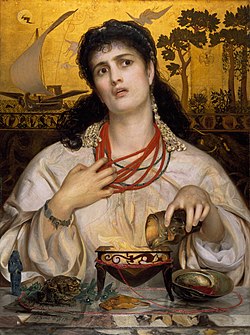Top Qs
Timeline
Chat
Perspective
Medea (Sandys painting)
1868 oil painting by Frederick Sandys From Wikipedia, the free encyclopedia
Remove ads
Medea is an 1868 oil painting on canvas by the Pre-Raphaelite painter Frederick Sandys. The painting was submitted to the Royal Academy of Arts for display in the Summer Exhibition of 1868 but it was rejected – most likely for internal politics and jealousies rather than artistic reasons.[1] The picture was accepted the following year and reviewed very favourably by The Times, which commented pointedly on its previous failure to win a place.[2]
Remove ads
Medea was modelled on Keomi Gray, a Romani woman whom Sandys had met in Norwich, England, and taken back to London to sit for many of his paintings.[3] According to a contemporary critic it shows the enchantress Medea "...in the act of incantation, the baleful light of her chafing-dish playing in the folds of her robe, and making the pale cheeks look paler, and the ashy lips more ashy, and kindling the array of foul ingredients and witch's properties that surround her tripod – foul toads and strange roots, and images of strange gods, and quaint shells filled with evil compounds."[4]
In 1911 the picture was sent to Italy for the international exhibition at Rome for the celebration of the jubilee of the Kingdom of Italy. The participating countries included Austria, Belgium, France, Germany, Japan, England, Russia, Serbia, Spain, USA, Hungary and Italy. The British Pavilion was designed by Sir Edwin Lutyens. In 1912 it taken over by the British School at Rome, which is still based there.[5]
Remove ads
References
Wikiwand - on
Seamless Wikipedia browsing. On steroids.
Remove ads

